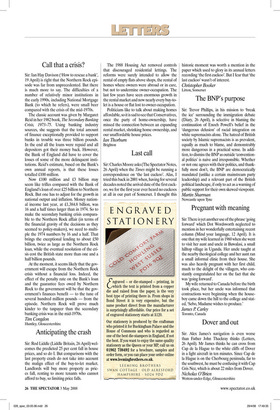Call that a crisis?
Sir: Ian Hay Davison (‘How to rescue a bank’, 19 April) is right that the Northern Rock episode was far from unprecedented. But there is much more to say. The difficulties of a number of relatively minor institutions in the early 1990s, including National Mortgage Bank (to which he refers), were small beer compared with the crisis of the mid-1970s.
The classic account was given by Margaret Reid in her 1982 book, The Secondary Banking Crisis, 1973–75. Using banking industry sources, she suggests that the total amount of finance exceptionally provided to support banks in trouble was three billion pounds. In the end all the loans were repaid and all depositors got their money back. However, the Bank of England did have to cover the losses of some of the more delinquent institutions. Reid’s estimate, based on the Bank’s own annual reports, is that these losses totalled £100 million.
Now £100 million and £3 billion may seem like trifles compared with the Bank of England’s loan of over £25 billion to Northern Rock. But one has to adjust for the growth in national output and inflation. Money national income last year, at £1,384.8 billion, was 16 and a half times larger than in 1974. So to make the secondary banking crisis comparable to the Northern Rock affair (in terms of the financial gravity of the decisions as they seemed to policy-makers), we need to multiple the 1974 numbers by 16 and a half. That brings the exceptional lending to about £50 billion, twice as large as the Northern Rock loan, while the eventual resolution of the crisis cost the British state more than one and a half billion pounds.
At the moment, it seems likely that the government will escape from the Northern Rock crisis without a financial loss. Indeed, the effect of the penalty rate on the Bank’s loan and the guarantee fees owed by Northern Rock to the government will be that the government’s finances benefit — to the tune of several hundred million pounds — from the episode. Northern Rock will prove much kinder to the taxpayer than the secondary banking crisis was in the mid-1970s.
Tim Congdon
Huntley, Gloucestershire


















































































 Previous page
Previous page